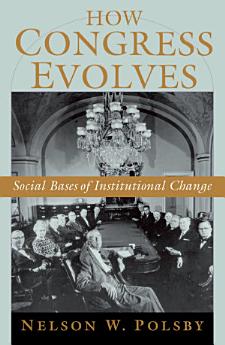How Congress Evolves: Social Bases of Institutional Change
Dec 2003 · Oxford University Press
Ebook
272
Pages
family_home
Eligible
info
reportRatings and reviews aren’t verified Learn More
About this ebook
From the end of the New Deal until quite recently, the U.S. House of Representatives was dominated by a conservative coalition that thwarted the Democratic majority and prevented the enactment of measures proposed by a succession of liberal Presidents. Today Presidents aren't necessarily liberal and the House of Representatives is not necessarily the graveyard of presidential proposals. What happened? Congress evolved. It all began with airconditioning. In this entertaining tale of one of our most august institutions, Nelson Polsby describes how the Democratic majority finally succeeded in overcoming the conservative coalition, changing the House. The evolution required among other things, the disappearance of Dixiecrats from the House Democratic caucus. Dixiecrats were replaced by the rise of the Republican party in the south. The Republican party in southern states was strengthened by an influx of migrants from the north, who came south to settle after the introduction of residential air conditioning, which made the climate more tolerable to Northerners. This evolutionary process led to the House's liberalization and concluded with the House's later transformation into an arena of sharp partisanship, visible among both Democrats and Republicans. A fascinating read by one of our most influential political scientists, How Congress Evolves breathes new life into the dusty corners of institutional history, and offers a unique explanation for important transformations in the congressional environment.
About the author
Nelson Polsby is Heller Professor of Political Science at the University of California, Berkeley where he has taught American politics and government since 1967. A close Congress watcher for more than 40 years, he is the author of, among others, Congress and the Presidency, and Presidential Elections (with Aaron Wildavsky, 10th edition.) He is editor of the Annual Review of Political Science and writes often for the Op-ed pages of the LA Times, Boston Globe, New York Times, Wall Street Journal and Washington Post.
Rate this ebook
Tell us what you think.
Reading information
Smartphones and tablets
Install the Google Play Books app for Android and iPad/iPhone. It syncs automatically with your account and allows you to read online or offline wherever you are.
Laptops and computers
You can listen to audiobooks purchased on Google Play using your computer's web browser.
eReaders and other devices
To read on e-ink devices like Kobo eReaders, you'll need to download a file and transfer it to your device. Follow the detailed Help Center instructions to transfer the files to supported eReaders.






